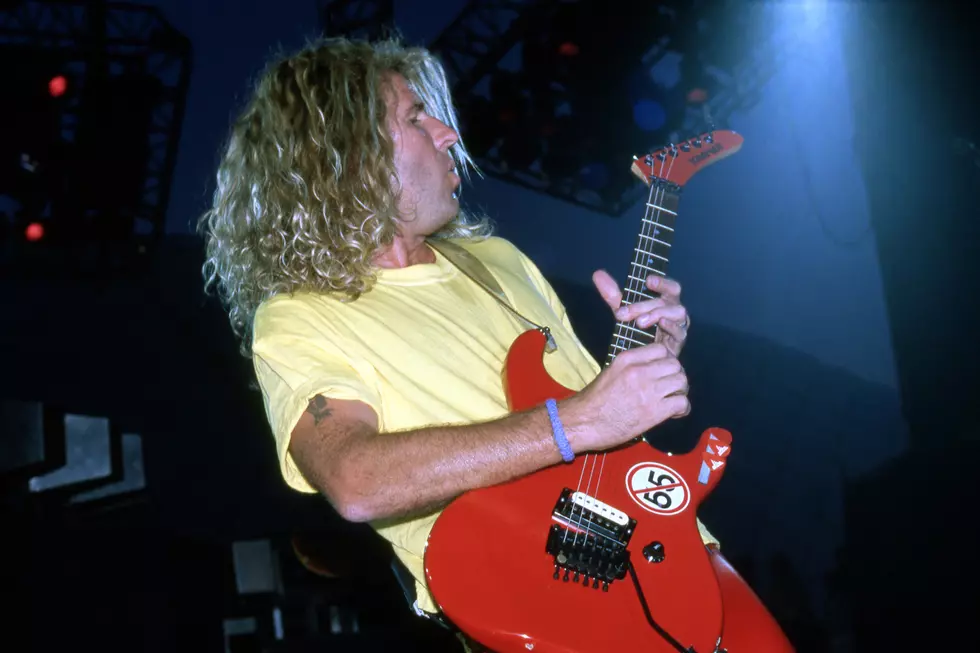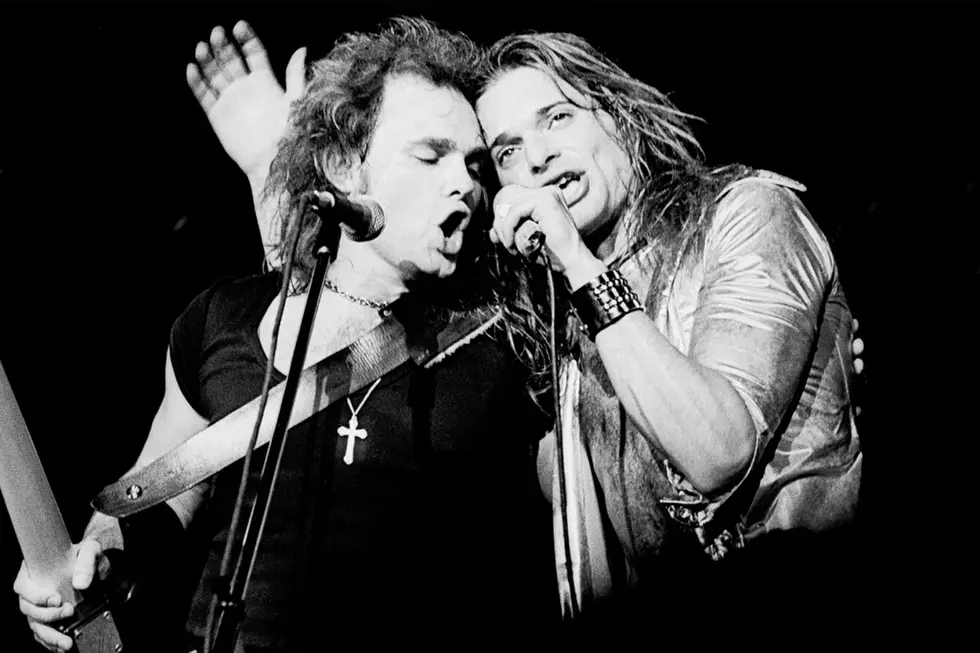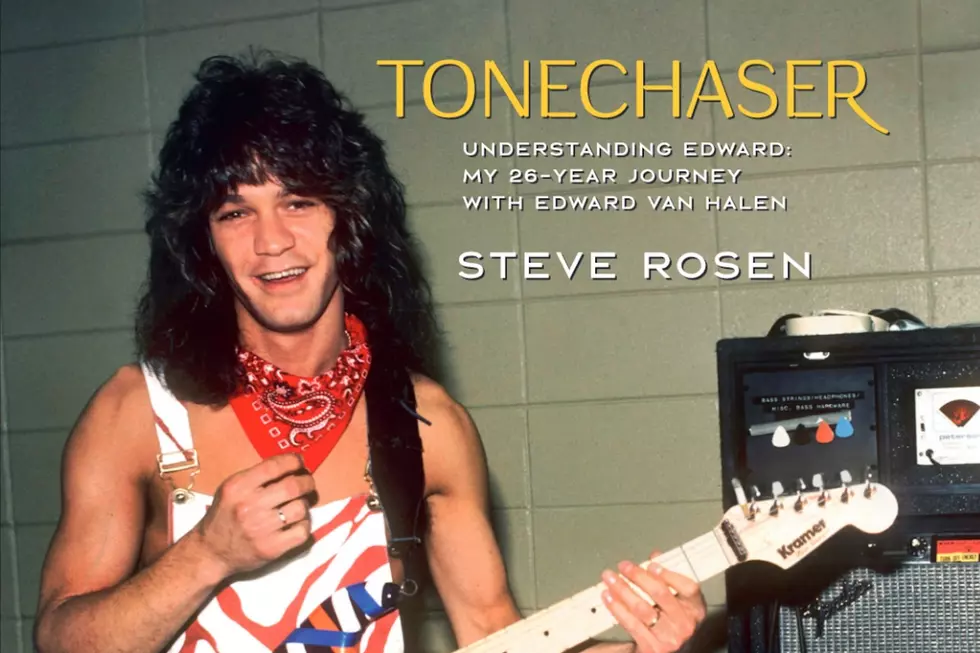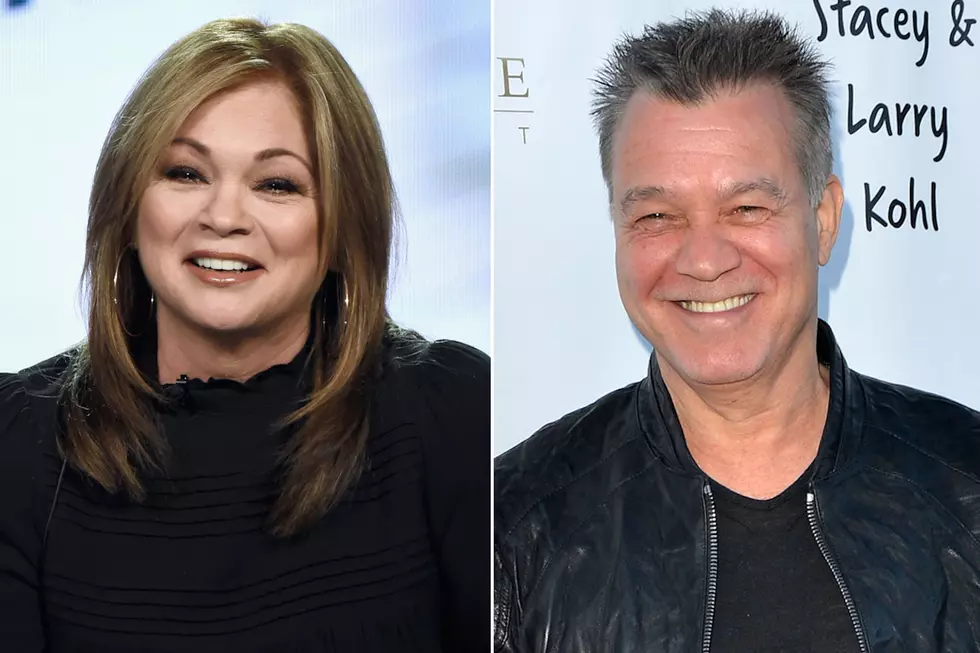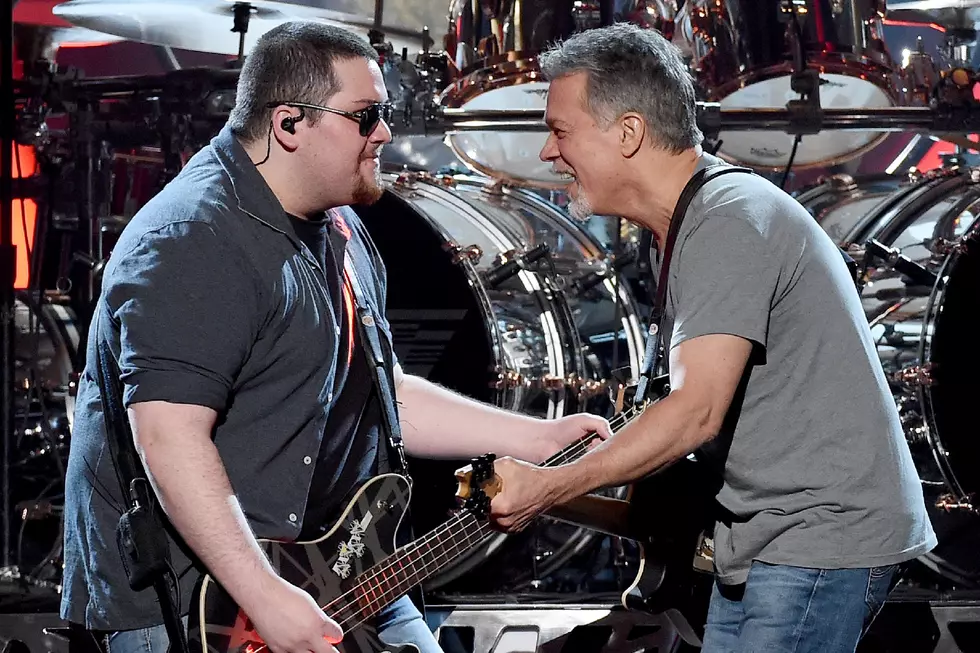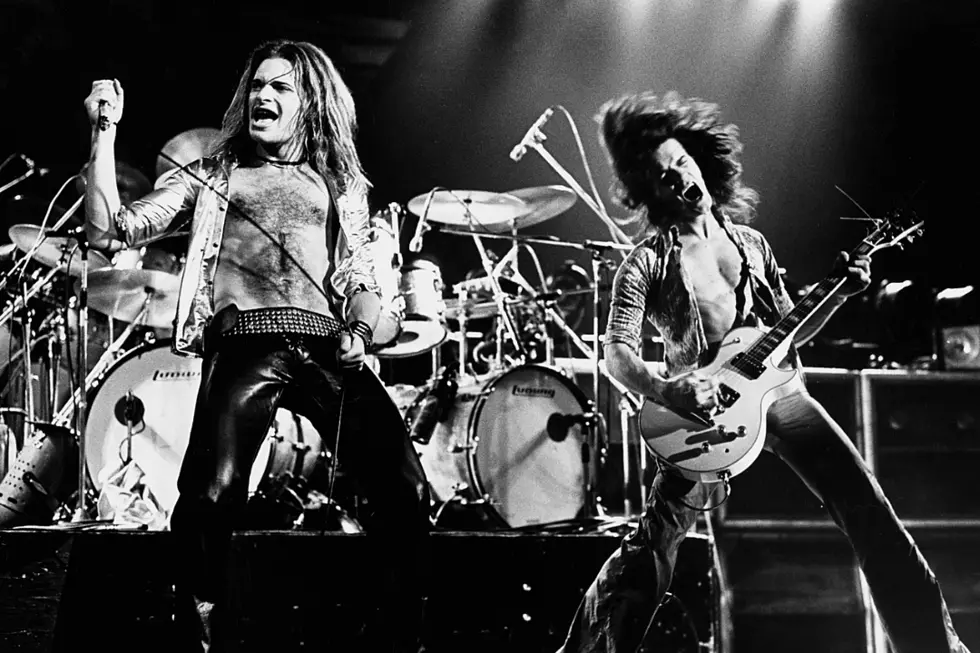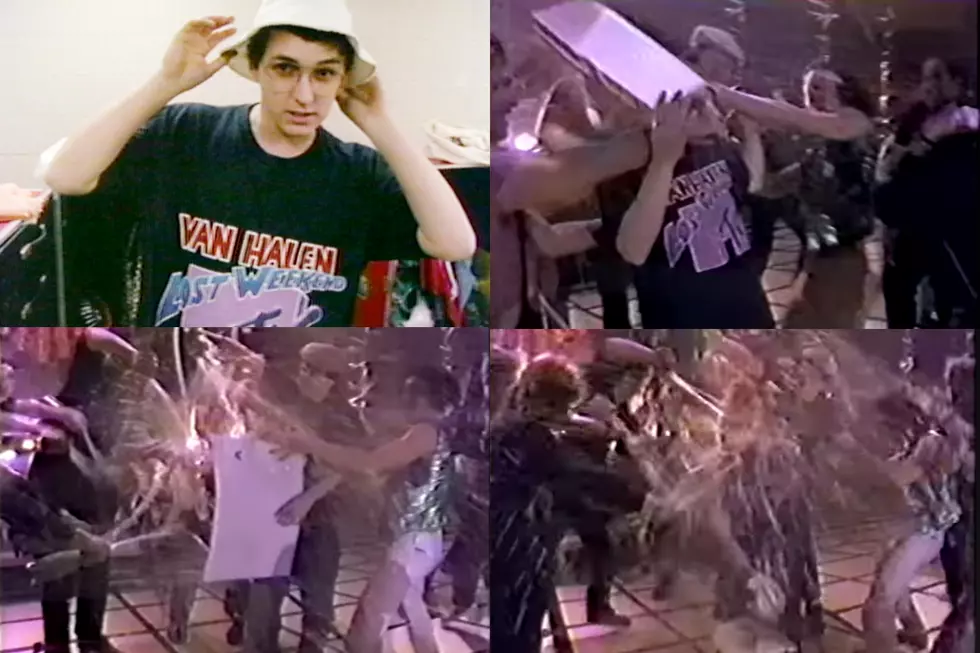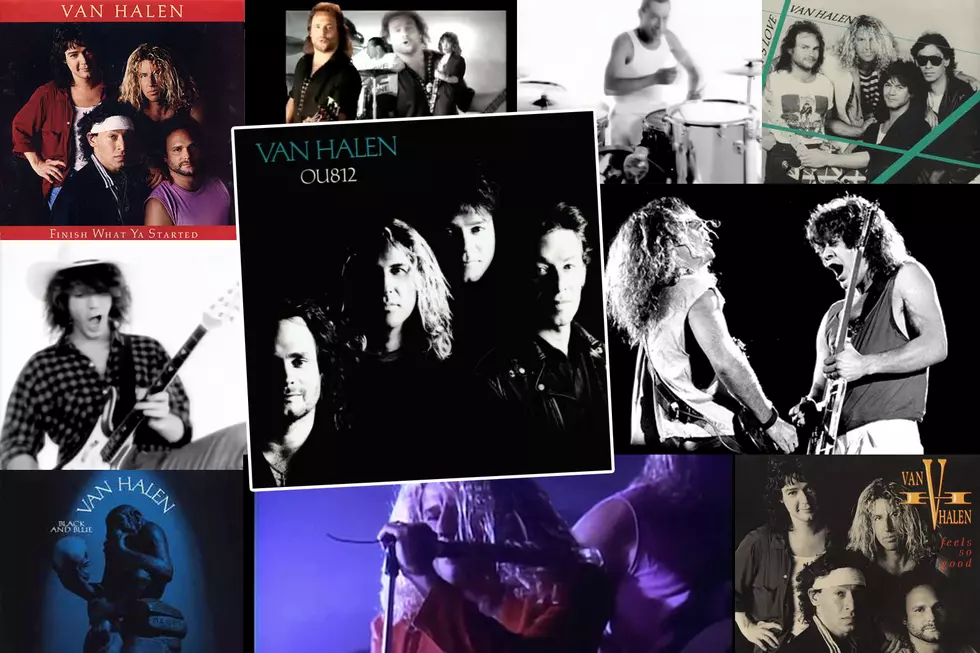
Van Halen’s ‘OU812′: A Track-by-Track Guide
Van Halen fans have debated the merits of David Lee Roth versus Sammy Hagar for decades, and that argument shows no signs of stopping.
Regardless of which side you take, there's no denying that the group flourished commercially in the years immediately following Roth's 1985 departure: 5150, their first record with Hagar at the mic, became Van Halen's first to top the Billboard album charts upon its release in 1986. When its follow-up, OU812, arrived a little more than two years later, it was easily one of the most hotly anticipated rock records of 1988.
If you're any kind of Van Halen fan, you know how the story goes: Just like 5150, OU812 hit No. 1, ultimately selling more than four million copies and sending a quartet of singles to the Top 40. Hagar would remain in the lineup for another eight years and two studio albums, yet in retrospect, it's easy to view OU812 as the closing chapter in the band's pop era. Subsequent releases had their share of hit singles, but it was easy to hear the group losing its enthusiasm for crossover success as early as 1991's For Unlawful Carnal Knowledge, an uneasy blend of catchy choruses and lumbering wankery.
The following track-by-track examination of Van Halen's eighth studio album takes listeners back to the spring of 1988, as everyone settled in to hear the latest release from one of the most popular rock bands on the planet:
"Mine All Mine"
Tense, hard-driving and moody, "Mine All Mine" is definitely one of OU812's darker — and less immediately gratifying — tracks. It doesn't exactly set the tone for what's to follow, but putting it in the lead-off slot sent a message regardless: If you were among the disgruntled Van Halen fans who felt like Hagar's lyrics tended toward the meathead end of the spectrum and you weren't happy about their relatively recent embrace of the power ballad, this song offered at least a few minutes of proof that they were still capable of rocking harder and digging a little deeper.
This was, as it turns out, entirely by design. "It was the first time in my life I ever beat myself up, hurt myself, punished myself, practically threw things through windows, trying to write the lyrics," Hagar later told Martin Popoff. Recalling a torturous 10-day process that included a particularly bad hangover and a private vocal tracking session with engineer Donn Landee, Hagar described the intense insecurity and uncertainty he felt while writing and recording his portion of the song — as well as the relief that came with the response. "It was kind of a new statement for Van Halen, and kind of for me too. I had never really said something quite that deep," Hagar admitted, "and quite honestly, the band came in, and everybody was going 'Fuck yeah!' It was a winner."
"When It's Love"
What were we saying about power ballads? The first song written for OU812, "When It's Love" is vintage post-Roth Van Halen, a track that bolts fat, shiny pop hooks onto a deceptively muscular rock arrangement, then tops the whole thing off with some Eddie Van Halen synths and Hagar lyrics about love. Toss in an effortlessly anthemic chorus and some instantly memorable "na na na" backing vocals, and you've got yourself a hit: The second single released from the record, "When It's Love" topped the rock charts and soared to No. 5 on the pop charts.
Before the fans weighed in, this was another track that left Hagar struggling with self-doubt. "I was the most insecure with those lyrics," he said during an In the Studio appearance. Eventually, it was time to sing, and after arriving at the studio with printed copies for the other band members and cutting his vocal track in the booth, Hagar walked out to what he recalled as overwhelming unanimous praise. As he put it, "Everybody said 'This is the best lyric you've ever written.'"
"A.F.U. (Naturally Wired)"
You don't hear them as often as you used to but for a really long time, any touring act worth its salt eventually recorded a touring anthem — and Van Halen got around to it with OU812's third track, "A.F.U. (Naturally Wired)." This was clearly never going to be a single, but there also isn't anything bad about it. It's just a solid meat-and-potatoes ode to the road, the kind of song a band can slip into the setlist to make the folks in the crowd feel like family.
As it turns out, the song was actually inspired by a particular show. Looking back on its genesis during their In the Studio interview, Hagar, Anthony and Alex Van Halen pointed to a night full of what Alex called "mishaps" — such as an over-capacity crowd as well as the stage and "part of the lighting system" catching on fire. "It was down and dirty, it was one of the highlights of our tour," Hagar said. "It was just a reckless show all the way around. It was crazy."
"Cabo Wabo"
The Dave vs. Sammy debate will probably never be settled. Those looking for an easy way to break down the divide could do worse than saying Roth often seemed eager to let listeners know how much fun he was having, while Hagar tended to take a more inclusive approach in his embrace of Van Halen's good-time vibes. "Cabo Wabo" is a serviceable case in point: A hypothetical Roth version of this track might have focused on his golden-god sexual exploits south of the border, but Hagar wants to take his lady — and by extension the listener — down to Cabo and show everyone around. As a seven-minute ode to fun in the sun, it's a fine enough way to close out what used to be Side One of the record; as a preview of Hagar's long drift into celebrity booze pitchman status, it's less entertaining.
To hear Hagar tell the story, the lyrics were inspired by actual events. One of multiple songs that got their start while he was getting some R&R in Mexico, "Cabo Wabo" came to Hagar after a morning breakfast excursion that almost included hitting a pedestrian who was staggering down a dirt road after what appeared to be a night of heavy drinking. "It occurs to me — this guy is doing the Cabo Wabo," Hagar wrote in his autobiography. After heading home to scribble down some lyrics written to the tune of the old Montrose song "Make It Last," he called Eddie and sang it to him over the phone. Hagar recalled Eddie saying, "Oh man, listen to this. Al and I worked this up last night." Then he played Hagar some music that sounded an awful lot like it had also been inspired by "Make It Last."
"Source of Infection"
By and large, Van Halen albums tend to be pretty quick and punchy, with relatively few filler cuts littering the track listings. Even at their laziest, the band members' compositional strengths typically produced at least a few moments worth pumping one's fist to. That being said: Lyrically as well as musically, "Source of Infection" sounds like something that took as long to record as it did to write. It's one among a number of OU812 tracks that makes plenty of room for those trademark Michael Anthony-assisted backing vocals, and Sammy hits some impressive high notes, but this isn't one of the better Van Halen songs from any era.
According to Hagar, he and Eddie weren't thrilled with the results either. Looking back on the song's liquor-fueled recording, he told Martin Popoff they "made a joke out of that song," much to the chagrin of Donn Landee and Alex Van Halen. "We knew we had enough hits on the record to pretty much do anything," Hagar admitted, "but it was very politically incorrect and personally. Eddie and I both kind of regret it, but it was a bad-ass piece of music."
"Feels So Good"
"Feels So Good" is probably one of the more divisive Van Halen songs from this era. Whichever side you happen to be on, it's hard to argue against your position. Is it a middle-of-the-road love song, led by some supremely cheesy synth work? Yes. Is it a very catchy cut that incorporates those killer backing vocals and a terrific Eddie solo? Also yes. Like the old truism tells us, two things can be true — and "Feels So Good" sums up the delightful dichotomy of peak Van Halen about as well as anything.
As it turns out, the song wasn't just divisive among Van Halen fans. It was also greeted with a mixed reception from the band members too. "It was in a pop Genesis style," Hagar told Popoff. "I liked it a lot; nobody else in the band liked it, except maybe Eddie."
"Finish What Ya Started"
Songs like "When It's Love" were machine-tooled for radio domination, but Van Halen didn't have to fall back on keyboards to enjoy chart success. Witness "Finish What Ya Started," a bluesy ode to blue balls that stands out by virtue of its reliance on acoustic guitars over the expected arena-rock pyrotechnics. One of the last songs written for OU812, it chased "When It's Love" onto the charts and nearly caught it, peaking at No. 13. According to Hagar, in true Van Halen fashion, the lyrics are really just all one big double entendre inspired by real-life experience.
Looking back on "Finish What Ya Started" in his autobiography, he recalled a late-night incident when Eddie showed up uninvited outside his Malibu home, carrying an acoustic guitar and a bottle of whiskey. "He started playing me the riff for 'Finish What Ya Started' and right away, I got excited," Hagar wrote, "and got my acoustic and started doing my Tony Joe White thing. I was still thinking about going back upstairs and getting laid and started singing, 'Come on, baby, finish what you started.' It never happened. … That song is about unfulfilled sex."
"Black and Blue"
During this era, it was fairly common for major rock acts to go with a less obvious choice for the first single from a new album. Instead of something overtly poppy, they'd tacitly assure hardcore fans they hadn't been forgotten by leading off with something that didn't have a prayer of cracking the Top 40. Van Halen pulled this trick by releasing the grinding "Black and Blue" as the first single from OU812, and it's a measure of just how popular they were at the time that the damn thing ended up peaking at No. 34 on the pop charts anyway. (It went to No. 1 at rock stations, of course.) It's easy to understand the thought process behind putting it out before "When It's Love," but as a single, "Black and Blue" is still kind of an odd duck.
It definitely assured fans that Van Halen hadn't lost its rock 'n' roll bona fides, but "Black and Blue" lacks the sort of grab-you-by-the-collar instant gratification shared by the band's best singles. Three years later, Van Halen would whet the market's appetite for their next LP, For Unlawful Carnal Knowledge, with the far more memorable "Poundcake." As for the inspiration behind the song? Well, that's fairly obvious. "Oh, yeah, that's sex," Hagar laughingly told UCR's Gary Graff. "You don't need to be a brain surgeon to figure that out."
"Sucker in a 3 Piece"
While it wouldn't be technically accurate to say 1988 was the dawn of the compact-disc era, it definitely found labels and artists in an awkward spot between taking advantage of the new format's capabilities and catering to consumers who were still hanging on to their cassettes and vinyl LPs. Like a number of albums released during this time period, OU812's track listing varied depending on how you bought it. For fans who opted out of the compact disc version, the record ended with "Sucker in a 3 Piece." This is basically as it should be. The song boasts your typical "how did she end up with him" narrative, a fairly basic and childish lament that finds Hagar appalled by the sight of a "nine on a 10 scale" woman out with a guy who has "a big ol' belly" and a "stone bald head." It's better than the worst song on your average Hagar solo album, but in the Van Halen catalog, it's barely passable.
Like "Cabo Wabo," this OU812 cut's lyrics came from Hagar's adventures in Mexico — and the story behind the song is basically everything you hear in the lyrics. "I saw this gorgeous chick poolside," he wrote in his autobiography. "This chick's giving me some vibes even though I was married and she was with this rich guy, the 'Sucker in a 3 Piece.'"
"A Apolitical Blues"
Folks who purchased OU812 on CD in 1988 were treated to this unexpected curveball, a cover of a lesser-known song by Little Feat. It's an entertainingly loose and sloppy way to close out the record, a fun chaser after the more immaculately produced tracks that precede it. But it's arguably most noteworthy for non-musical reasons: Not only were Little Feat labelmates with Van Halen, but they also shared engineer Donn Landee, who rode shotgun as co-producer for OU812 and was also present when producer Ted Templeman (who'd been behind the boards for Van Halen's biggest hits) tracked the original version of "A Apolitical Blues." If you're familiar with both bands, you wouldn't necessarily expect Van Halen to cover Little Feat, but this is a solid fit.
Eddie Van Halen Year by Year: 1977-2017 Photos
Five Little-Known Van Halen 'Poundcake' Facts
More From Ultimate Classic Rock
